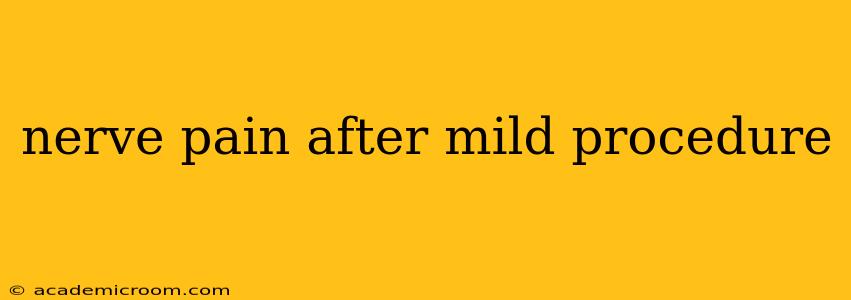Experiencing nerve pain after a seemingly mild medical procedure can be unsettling. While many procedures are minimally invasive and cause minimal discomfort, nerve damage, however unlikely, is a possibility. This comprehensive guide explores the potential causes of nerve pain following a mild procedure, effective treatment options, and preventative measures.
What Causes Nerve Pain After a Mild Procedure?
Nerve pain, or neuropathic pain, after a mild procedure isn't always directly caused by the procedure itself. It's crucial to understand the potential contributing factors:
- Direct Nerve Injury: Although rare in mild procedures, it's possible for a needle, catheter, or instrument to inadvertently damage a nerve during the procedure. This is more likely if the procedure is near a major nerve bundle.
- Inflammation: Even minor trauma from a procedure can trigger inflammation around nerves. This inflammation can compress or irritate the nerves, leading to pain.
- Trapped Nerve: Sometimes, swelling or bruising after a procedure can put pressure on a nerve, resulting in pain. This is a temporary condition, often resolving as the swelling subsides.
- Pre-existing Conditions: Individuals with underlying nerve conditions might experience exacerbated pain after even a minor procedure. These conditions could include diabetes, fibromyalgia, or other neuropathies.
- Medication Side Effects: Some medications administered during or after a procedure can have nerve pain as a side effect.
- Infection: While less common with mild procedures, an infection at the procedure site can cause inflammation and nerve irritation.
How Long Does Nerve Pain After a Procedure Last?
The duration of nerve pain varies significantly depending on the cause and severity. In cases of minor inflammation or trapped nerves, the pain might resolve within days or weeks. However, more severe nerve damage may lead to persistent pain lasting for months or even longer.
What are the Symptoms of Nerve Pain After a Mild Procedure?
Nerve pain manifests differently in individuals, but common symptoms include:
- Sharp, shooting pain: This is often a hallmark of nerve damage.
- Burning or tingling sensation: A characteristic sign of nerve irritation.
- Numbness or loss of sensation: This can occur in the area where the nerve is affected.
- Increased sensitivity to touch: Even light touch can cause significant pain.
- Weakness or muscle atrophy: In cases of severe nerve damage.
What Treatments are Available for Nerve Pain After a Mild Procedure?
Treatment options depend on the cause and severity of the nerve pain. Your doctor might recommend:
- Over-the-counter pain relievers: Ibuprofen or acetaminophen can help manage mild to moderate pain.
- Prescription pain medications: Stronger analgesics or anti-inflammatory drugs may be necessary for more severe pain.
- Anti-seizure medications: These medications can be effective in treating neuropathic pain by stabilizing nerve activity.
- Antidepressants: Certain antidepressants have also shown to be beneficial in managing nerve pain.
- Physical therapy: Exercises and stretches can help improve nerve function and reduce pain.
- Steroid injections: In some cases, injections of corticosteroids can help reduce inflammation around the affected nerve.
- Surgery: Rarely necessary for nerve pain after a mild procedure, but might be considered in cases of significant nerve damage.
Can Nerve Pain After a Mild Procedure Be Prevented?
While not all nerve pain is preventable, taking certain precautions can reduce the risk:
- Discuss your medical history with your doctor: Inform your doctor about any pre-existing conditions that could increase your risk of nerve complications.
- Follow your doctor's instructions carefully: Adhering to post-procedure instructions can minimize the risk of complications.
- Manage underlying medical conditions: Controlling diabetes or other health issues can help prevent nerve damage.
Is Nerve Pain After a Procedure Always Serious?
No, nerve pain after a procedure is not always serious. Many cases resolve on their own with conservative treatment. However, persistent or worsening pain warrants a prompt follow-up with your doctor to rule out more significant issues.
When Should I See a Doctor About Nerve Pain After a Procedure?
Seek immediate medical attention if you experience:
- Severe or worsening pain
- Numbness or weakness spreading beyond the procedure site
- Signs of infection (redness, swelling, fever)
Remember, this information is for general knowledge and doesn't substitute professional medical advice. Always consult your doctor or healthcare provider for diagnosis and treatment of any medical condition.
